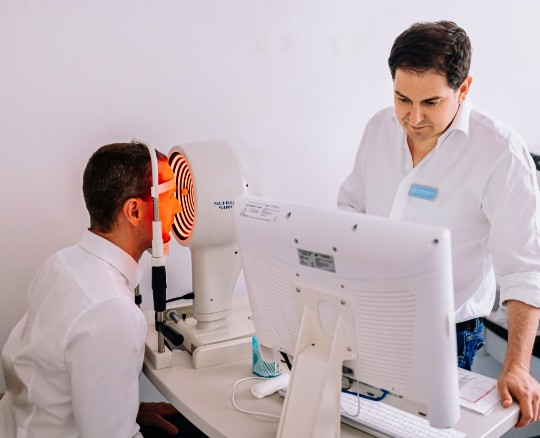Presbyopia is the age-related need for reading glasses
- You can correct this common visual error with our ultra-precise Swiss-optmised eye treatments




Gain visual freedom with our Swiss method for exceptional laser eye surgery
Discover everything you need to know about presbyopia and how we treat it below
Do you find that the text in a newspaper or on your phone is getting smaller and smaller? Perhaps you need to hold them further away to read them. If this is the case, you most likely have presbyopia.
Presbyopia is a form of ametropia which means the age-related need for reading glasses. It usually begins around the age of 45 and can be accompanied by recurring headaches.
Every individual has a loss of vision to some degree between the ages of 40 and 60. The lens simply loses elasticity due to calcification, and the eye loses its ability to adapt to environmental conditions. It can no longer switch optimally between long and short distances.
The good news is, we can significantly reduce or even eliminate the need for reading glasses through surgical methods.
Presbyopia is not a disease but rather a physiological ageing process. It is dynamic, which means that your vision will deteriorate even more as you age.
Presbyopia occurs because the eye’s lens, like the entire human organism, ages over the years. Limescale deposits reduce the elasticity of the lens. From around the middle of life, the lens loses its ability to accommodate. This means that it can no longer easily switch between near and far vision.
By the way, presbyopia affects everyone without exception – regardless of whether you had poor vision before. However, accommodation does not deteriorate continuously until the end of life. Rather, it comes to a standstill around the age of 60.
At the beginning of your first visit to us, we conduct a comprehensive examination. Here we record any previous illnesses, any past operations, and any medications that you take. We will also discuss your presbyopia and how it affects your life, and what we can do to help you.
We will thoroughly examine your eyes and take note of your exact visual acuity and degree of presbyopia. We will also examine your retina and measure the pressure inside your eye to determine if any other eye diseases present. We then measure the eye very precisely. This includes optical biometrics, which is the most precise examination method. It measures the axial length and sections of the eyeball. We also record the corneal curvature.
All this is done contact-free with a laser. This method is exceptionally safe and accurate.
We also carefully examine and measure the cornea. The cornea is the “window” of the eye – light falls through it. Together with the lens, the cornea represents the optical system.
For an optimal correction of presbyopia, we make an exact map of the cornea. Using a corneal topography, we can measure the anterior and posterior walls and the thickness of the cornea very precisely. This examination serves to determine all anatomical properties of the cornea. The refractive power of the eyes is derived from this “map”, which plays a vital role in the corrective operation.
Soon, we will also be offering anterior segment optical coherence tomography. This examination is contactless and can be compared to an ultrasound examination. However, laser light is not used for this purpose.
Finally, we will carry out a wavefront examination. Here we send a light beam into the eye to focus precisely on the retina. From this point, a light wavefront propagates through the lens and cornea. With the help of this examination method, we can determine precisely where the laser should be applied to optimise eyesight.
If you dislike reading glasses, varifocals or trifocals, you have several options to correct your presbyopia. At EyeLaser, we offer various options for correcting presbyopia. Together we will choose the most suitable process for you.
These procedures are available to you at EyeLaser for correcting presbyopia:
Monovision, either with:
Laser surgery
We can treat age-related long-sightedness with a laser treatment called PresbyMax or monovision. This means we create one short-sighted eye and one normal-sighted eye (for good distance vision).
The advantage of laser eye surgery for presbyopia is the minimally invasive procedure. In contrast to lens surgery, we don’t need to open the eye, and the laser treatment is limited to the cornea. As a rule, people between 40 and 65 are usually suitable for this type of treatment.
Lens surgery
We can perform lens surgery with a variety of different, individually adapted lenses. We offer the right lens for every form of ametropia:
You can easily test whether you have presbyopia. Concentrate on reading a text close up, then quickly look at the window, a picture or the TV set that is further away. If it takes a few seconds for your eyes to adjust to distance vision (until you can see clearly again), then you should seek professional help.
Choose the option below that sounds most like you to discover your best treatment

After 40, most of us need reading glasses (even if we’ve never needed glasses before!) Freedom from reading glasses is possible but not everyone’s eyes can be treated. Book an assessment below to find out if you’re suitable for reading glasses treatment:
BOOK AN ASSESSMENTWe are proud to be associated with top quality private medical insurance





95.89% to be precise (we’re Swiss. We measure everything). But don’t take our word for it…
Discover Austria’s most popular laser eye surgeons in the heart of Vienna and Linz

Things like age, eye shape, history and lifestyle make an eye treatment perfect for one person, but not another. Find out which treatment (if any) could free you from your reading glasses
Take a quiz